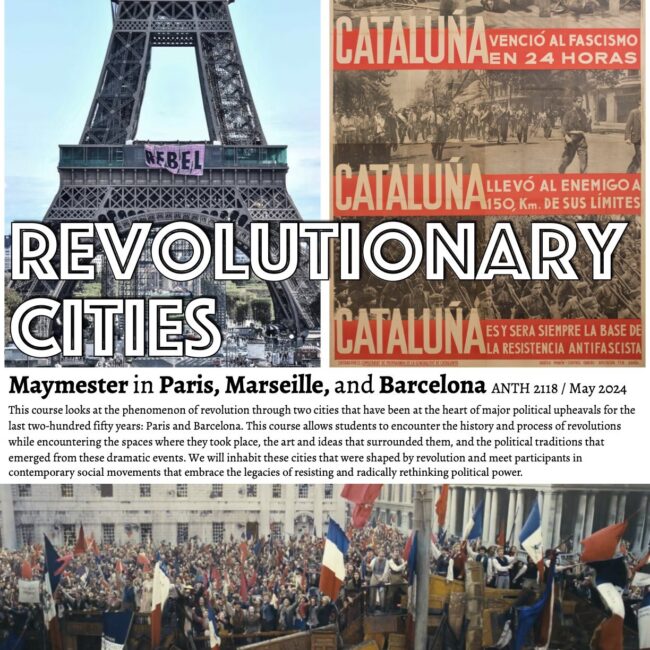Revolutionary Cities (Paris & Barcelona) | Maymester 2024
Revolutionary Cities:
Urban Uprisings in Paris and Barcelona
Applications due January 31, 2024
Consult the Maymester website for details as soon as possible
Revolutionary Cities (ANTH 2118) looks at the phenomenon of revolution through the history and present political traditions of two cities that have been at the heart of major political upheavals for the last two-hundred fifty years: Paris and Barcelona.
The vast majority of governments worldwide trace their legitimacy to a revolution. And modern ideas of revolution can, in part, be traced to the French Revolution, led largely by metropolitan Paris. Likewise, socialist revolutionaries look back to the Paris Commune of 1871 and socialists and anarchists also to the Spanish Republic, which achieved its greatest transformation in Catalunya from 1936 to 1939. Student, youth, and labor protests combined in France’s extraordinary May 1968 uprising. These diverse revolutions have shaped the meaning of political action in both cities and the countries of which they are a part. Workers, racial minorities, squatters, nationalists, and political radical continue to use revolutionary ideas, symbols, and tactics in contemporary movements in both cities.
The heart of this course is on-site presence in the urban spaces of Paris and Barcelona (and briefly Marseille) where people collectively demanded and sometimes achieved political change. This course allows students to encounter the history and process of revolutions while encountering the spaces where they took place, the art and ideas that surrounded them, and the political traditions that emerged from these dramatic events. We will inhabit these cities that were shaped by revolution and meet participants in contemporary social movements that embrace the legacies of resisting and radically rethinking political power.
If you join this class you can expect to see a lot of both Paris and Barcelona, as well as spend a weekend in Marseille on the Mediterranean coast of France. In and around Paris, we will visit Versailles, Montmartre, Nanterre, and the Latin Quarter; and museums including the Musée Carnavalet, Musée de Quai Branly, and La Contemporaine. In Barcelona, we’ll spend time in the city center, Ciutadella, El Raval, and Montjuic, and visit Catalunya’s National History and Art Museums, Picasso Museum, and Centre de Cultura Contemporània de Barcelona. Students will have free time in both cities for both group projects and further exploration.
About the Instructor: Carwil Bjork-James is a cultural anthropologist focuses on how people collaborate in protest, including those that coordinate nationally, create large national disruptions, and overthrow government. And is the author of The Sovereign Street: Making Revolution in Urban Bolivia: https://sovereignstreet.org/ While his direct fieldwork on that topic took place in Bolivia, where presidents have resigned in the face of mass protest in 2003, 2005 and 2019, Bjork-James has long researched the traditions of mass protest and revolutionary movements in France and Spain, the locations for this course. His connections with radical movements in Spain date back two decades. Our expected TA (to be confirmed soon) is a graduate student from France who works on mass movements, politics, and race.
Applications for Maymester are Due by January 31, 2024
Details are here: https://www.vanderbilt.edu/geo/maymesters/
